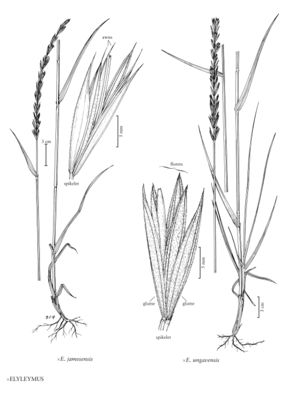×elyleymus jamesensis
Plants rhizomatous. Culms 90-130 cm tall, about 5 mm thick. Leaves somewhat basally concentrated; sheaths smooth, glabrous; auricles well developed; ligules about 0.3 mm on the lower leaves, to 3 mm on the upper leaves; blades 5-6 mm wide, veins equally prominent on the adaxial surfaces. Inflorescences spikes, 15-25 cm long, 6-12 mm wide, with 1-2 sessile or subsessile spikelets per node; internodes 8-15 mm, angles scabrous or hispid. Spikelets 16-28 mm, with 3-4 (5) florets. Glumes 12-20 mm long, 2-3 mm wide, 3-5-veined, scabrous and sparsely hairy, tapering gradually from about midlength, margins scarious, apices subulate or awned, awns to 4 mm; rachilla internodes pubescent or villous; lemmas 8.7-16 mm, with appressed hairs at the base, glabrous elsewhere, awned, awns 1-3 mm; paleas with ciliate keels and retuse to bidentate apices; anthers 2-3 mm.
Discussion
×Elyleymus jamesensis comprises hybrids between Elymus trachycaulus and Leymus mollis. Lepage (1952) recognized three different infraspecific taxa, depending on the variety of Agropyron trachycaulum [= Elymus trachycaulus] involved. Because all the varieties concerned are treated here as part of E. trachycaulus subsp. trachycaulus, no attempt has been made to distinguish Lepage's infraspecific taxa. The above description includes ×Agroelymus adamsii J. Rousseau, which, according to Bowden (1967), is a synonym of ×E. jamesensis.
Selected References
None.
Lower Taxa
"decumbent" is not a number.
